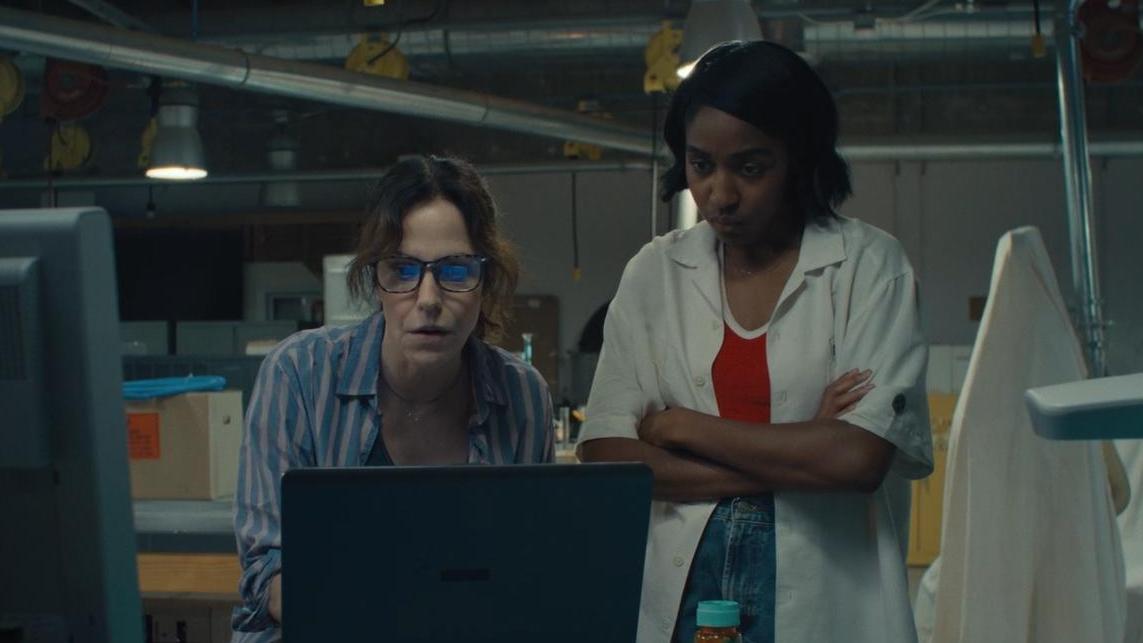SXSW’s Omni Loop is a surprisingly humanizing science fiction tale exploring the importance of connection. It’s a grandiose yet mostly focused enterprise that nails the quirky, offbeat comedy that can arise when death looms. With a witty, nuanced cast, fantastic direction, and music that elevates the quirk, Omni Loop is a delightful, teary surprise that deserves accolades.
Brazilian filmmaker Bernardo Britto writes and directs this science-fiction gem. The film follows Zoya Lowe, played by Mary-Louise Parker, a woman with a black hole in her chest. Doctors give her about a week left to live. However, with a mysterious bottle of pills she found as a child, she’s able to go back in time one week. And we’re off on this colorful, complex emotional journey toward acceptance.
Omni Loop Takes a Unique Spin on a Known Story
As a skilled scientist, Zoya doesn’t take the doctor’s “week of life left” decree lying down. With the pills, she can repeat her week over and over to learn how to survive. But that’s not her end game. She wants to go back further and live her life differently. With the help of another gifted thinker, Paula, played by Ayo Edebiri, the two work to discover the ingredients of Zoya’s pills and figure out the secret to time travel. Rounding out the character list is Zoya’s husband, Donald (Carlos Jacott), her daughter Jayne (Hannah Pearl Utt), and Jayne’s fiance Morris (Chris Witaske).
Yes, you’ve seen Omni Loop’s premise before. But the addition of science and how the pills work serve as additional layers, making the whole thing stand out even more.
Emotional Weight Amidst the Laughs
From sitting awkwardly on a train to casually walking out of a building as firefighters race past them, many scenes elicit laughter. But the movie builds up so much more about what a life well-lived means, not to mention exploring regret and purpose. Plus it’s great to see (too often underrepresented) women scientists as the focus of this journey.
Zoya’s world is a loop, beginning with when she discovered the pills as a child and learned that she would change the world. One day, while visiting her mother at a senior home, she bumps into Paula. Given Paula’s academic field and that she’s carrying a book on quantum mechanics written by Zola, it’s more than a happenstance meeting. But interpretation is a tricky thing. Hearing someone say she’ll change the world and finding the pills with her name on them leads Zola to believe Paula’s purpose is to help her solve time travel.
However, sometimes changing the world takes a path like Sarah Connor’s, where she gives birth to the person who turns the tide for humanity. Omni Loop highlights how, though some might want to be the star when it comes to changing the world, being in connection with loved ones is everything. It is frustrating that only when Zola gives up does she appreciate what she has. That’s a common trope, though, and director Britto captures it better than many, hinting with Zoya’s flashbacks to a growing realization of how fortunate her life has been. In the end, Britto delivers a profound emotional movie that incorporates levity to make a statement about appreciating what one has and enjoying what time you have with them.
Everyone Has Regrets, But Seeing This Movie Is Not One of Them
Mary-Louise Parker and Ayo Edebiri are a phenomenal pair. Their characters work well together as they explore solutions to time travel. This movie emphasizes the human moments, and though we might be the stars of our adventures, we also play a minor role in the stories around us and we should never discount or disconnect from that. Bernardo Britto is one to watch, creating and executing an excellent film highlighting the importance of connection.

